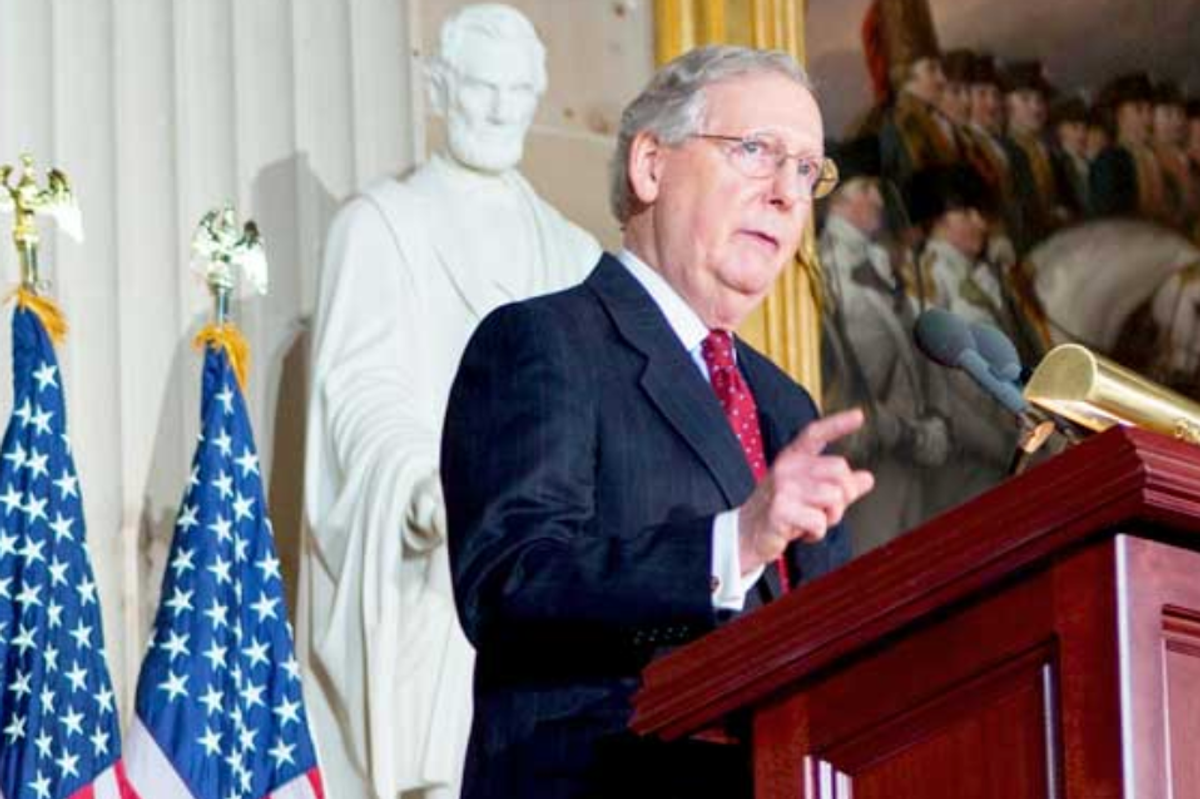Republicans Insist On Preserving Filibuster (Except When They Don’t)

Sen. Mitch McConnell
Reprinted with permission from American Independent
Senate Republicans are mounting an aggressive campaign to keep their power to block nearly all of the new Democratic majority's legislative proposals.
But while they now defend the Senate's filibuster rule as vital for "bipartisanship," they unanimously voted to eliminate it for Supreme Court nominations less than four years ago.
While it only takes a simple majority in the 100-member U.S. Senate to pass legislation, with few exceptions it takes a three-fifths supermajority — 60 votes — to end debate and actually hold a vote. Segregationists long used those cloture rules to block civil rights legislation and Senate Republican Leader Mitch McConnell used them a record-breaking number of times to obstruct President Barack Obama's agenda.
Senate rules would allow just 51 senators to change that 60-vote threshold. After Democrats retook a narrow majority in the chamber on Wednesday, McConnell (R-KY) and his colleagues began demanding Democrats agree in advance not to do so.
Much of their argument has centered on the importance of preserving the super-majority requirement as a way to ensure bipartisan decisions.
But back in April 2017, the 60-vote requirement also applied to Supreme Court nominations. When Donald Trump nominated conservative Neil Gorsuch to the high court, he lacked the needed supermajority to be confirmed.
Rather than find a nominee palatable to a large bipartisan majority, McConnell and every Republican senator voted to change the rules to eliminate the filibuster for Supreme Court nominees. They then confirmed him on a mostly party-line vote for a lifetime appointment.
That has not stopped many of those same Republican senators from taking the opposite view now.
McConnell is currently blocking an organizing resolution that would allow Senate committees to operate, demanding that he keep his power to block bills.
"Leader McConnell expressed his long-held view that the crucial, longstanding and bipartisan Senate rules concerning the legislative filibuster remain intact, specifically during the power share for the next two years," his spokesman told the Associated Press on Tuesday.
"The 60 vote cloture requirement (filibuster rule) requires bipartisanship and provides stability in our laws -- something we should all want in a big, diverse country of 330 million people," Sen. John Cornyn (R-TX) tweeted on Friday.
Sen. Chuck Grassley (R-IA) agreed, tweeting on Friday, "Senate GOP majority fended off calls to end legislative filibuster incl from Pres Trump We didn't cave 2pressure 2go 'nuclear' on legis filibuster bc we knew weight of keeping Senate the gr8 deliberative body Framers of Constitution intended Its time for Senate Democrats 2do same."
On Thursday, Sen. Marco Rubio (R-FL) tweeted a years-old quote from Biden explaining the rationale for the filibuster rule, opining, "Makes sense to me!"
According to a Politico report on Thursday, Sen. Susan Collins (R-ME) backed McConnell's efforts to force Democrats to keep the rule, saying, "You want to do it before there's an emotional, difficult, controversial issue. So that it isn't issue-driven, it's institution-driven."
Sen. Lindsey Graham (R-SC) told the outlet that his party needs Majority Leader Chuck Schumer to say "we're not going to change the legislative filibuster."
Sens. McConnell, Cornyn, Grassley, Rubio, Collins, and Graham all voted for the 2017 rule change.
Published with permission of The American Independent Foundation.
- Harry Reid Threatens To Go 'Nuclear' On The GOP ›
- 5 Worst Moments Of Ted Cruz's Fake Filbuster - National Memo ›
- Senate Republicans Allow Vital Jobless Benefits To Lapse, Then ... ›
- Senate Republicans Suddenly Call For New Biden Probe - National ... ›
- 5 Ways The GOP's Obstruction Is Unprecedented - National Memo ›
- McConnell Retreats From Fight Over Senate Rules ›
- Texas Republican’s Complaint: Biden Doesn’t Tweet Enough - National Memo ›
- Senate Changes Rules To Move Gorsuch Supreme Court ... ›
- McConnell went 'nuclear' to confirm Gorsuch. But Democrats ... ›
- Democrats frustrated as fight over filibuster stalls power-sharing ... ›
- Democrats' hope for fast start in Senate stalled by Republican ... ›
- Fact check: GOP ended Senate filibuster on Supreme Court nominees ›
- Why the Senate Filibuster Could Be Gone in 2021 - The Atlantic ›
- Senate Republicans throw cold water on Biden's immigration proposal ›
- Opinion | Biden Should Rally Senate Democrats to Kill the Filibuster ... ›








